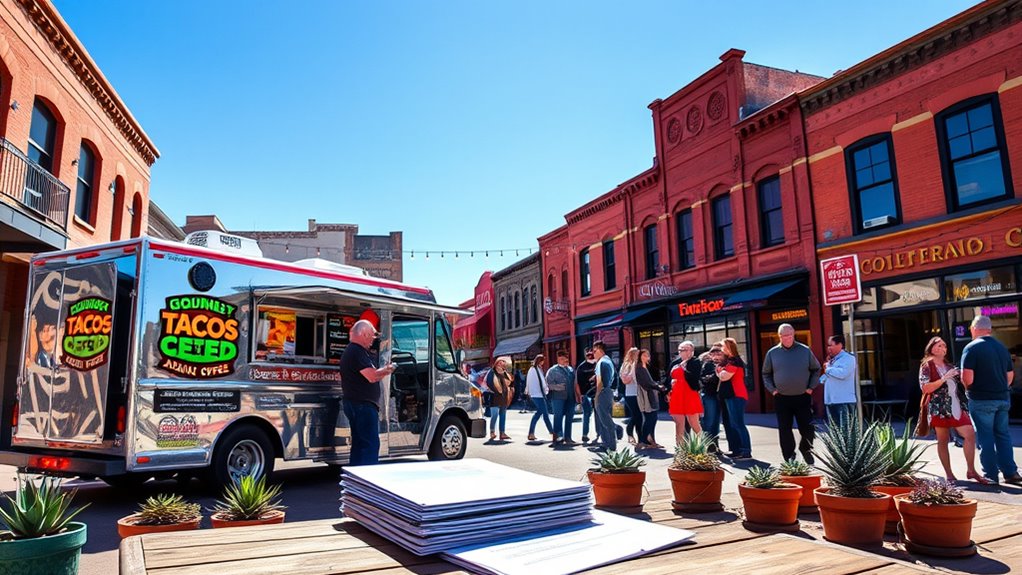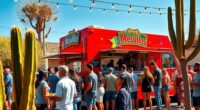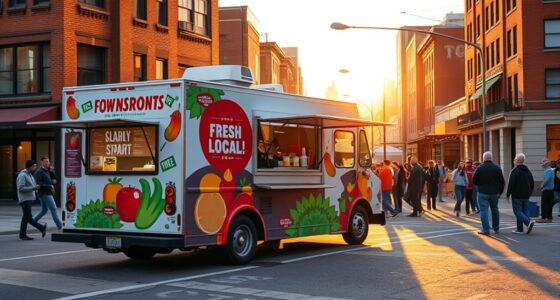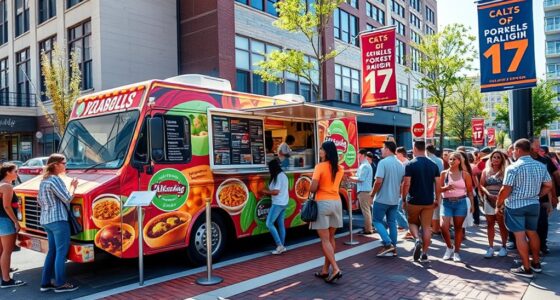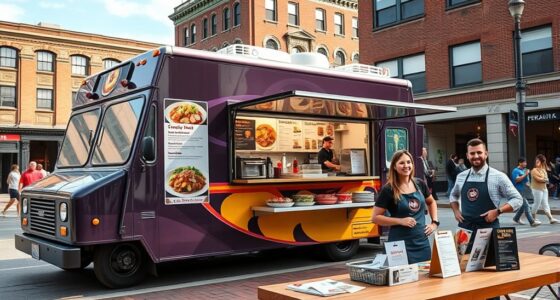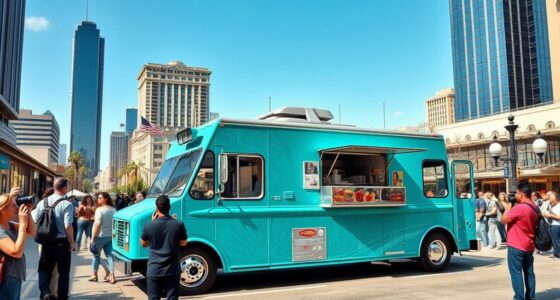To open a food truck in Colorado Springs, you need to secure permits like a Retail Food Establishment-Mobile License, Mobile Food Vendor License, and applicable zoning permits. Costs vary from $100 to over $28,000, depending on permits and truck setup. Choose high-traffic locations, such as downtown, parks, or events, and craft a menu that meets food safety standards. Effective marketing will boost your visibility, and staying compliant is key—if you continue, you’ll discover all the essentials.
Key Takeaways
- Obtain required permits such as Retail Food Establishment-Mobile License, Mobile Food Vendor License, and zoning permits for legal operation.
- Budget $40,000-$150,000 for startup costs, including truck purchase, licensing, inventory, and permits.
- Choose high-traffic locations like downtown, events, or private property with proper permissions and zoning compliance.
- Develop a menu focused on food safety, temperature control, and efficient storage to prevent foodborne illnesses.
- Utilize social media, community events, and local partnerships to market your food truck and build customer loyalty.
Navigating Permitting and Licensing Requirements
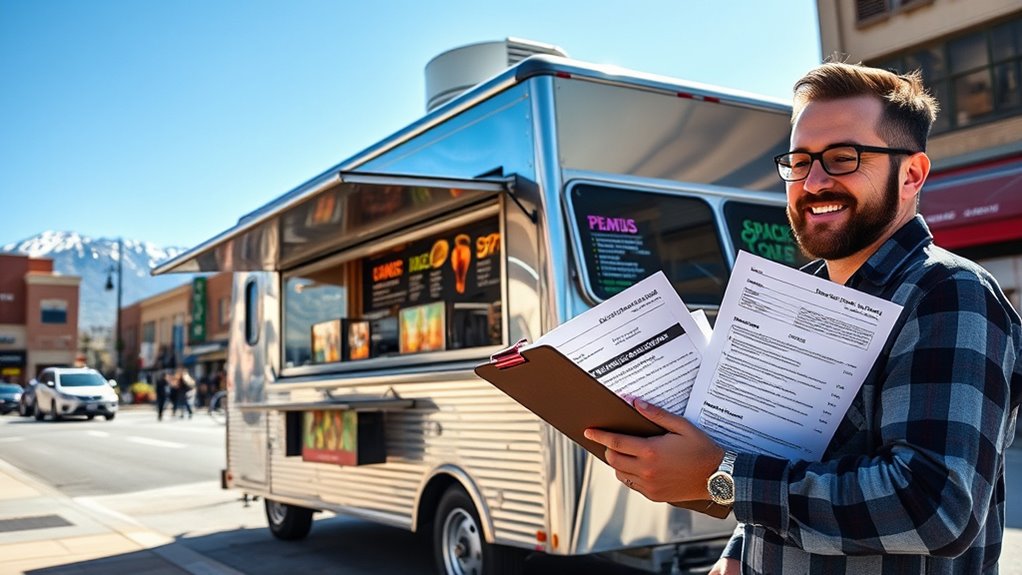
Steering permitting and licensing requirements is a vital step to legally operate a food truck in Colorado Springs. You’ll need a Retail Food Establishment-Mobile License to comply with local food safety laws. The Colorado Department of Public Health & Environment also issues a Retail Food License, confirming your adherence to health standards. Additionally, all mobile vendors in Colorado Springs must obtain a Mobile Food Vendor License, along with a zoning permit to operate legally in designated areas. You’ll also need a sales tax license from both the state and city to handle tax collection and reporting. Business licensing is essential before starting, and if you plan to cook using fuel sources like propane, fire permits and safety inspections are mandatory. Applying for all these licenses requires thorough documentation and adherence to specific application procedures. Ensuring compliance with local food safety regulations helps prevent potential legal issues and fines. Keeping these permits current and following fire safety regulations ensures smooth, lawful operation.
Understanding Cost Implications for Your Food Truck Venture
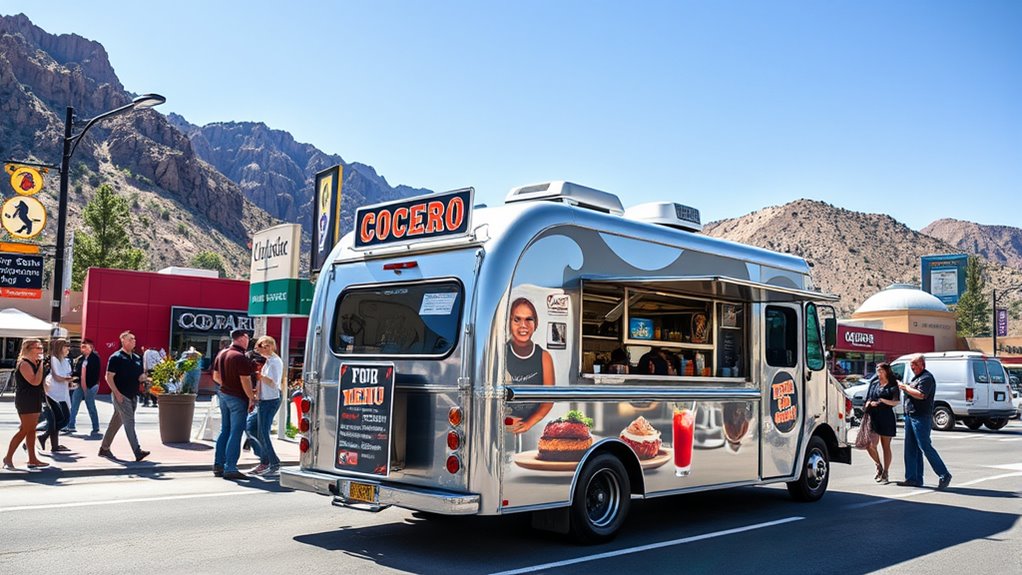
Understanding cost implications for your food truck venture is essential to guarantee your business remains financially sustainable. Your initial investment can range from $40,000 to $150,000, depending on whether you buy new or used and customize it. Licenses and permits vary widely, costing from $100 up to over $28,000 in Colorado. You’ll need $2,000 to $3,000 for inventory and $300 for serveware to start operations. Ongoing expenses include fuel, maintenance, insurance, and staffing, which typically total $500 to $1,000 monthly. Food costs depend on your menu complexity, while renting a commercial kitchen adds to expenses. Marketing, event participation, and promotional activities also require budget planning. Properly guarantee these costs helps you develop a realistic financial plan and ensures your food truck stays profitable. Location-specific licensing can significantly influence your total startup costs and ongoing expenses. Additionally, understanding cost management strategies can help optimize your spending and increase profitability.
Choosing the Perfect Locations for Your Food Truck in Colorado Springs
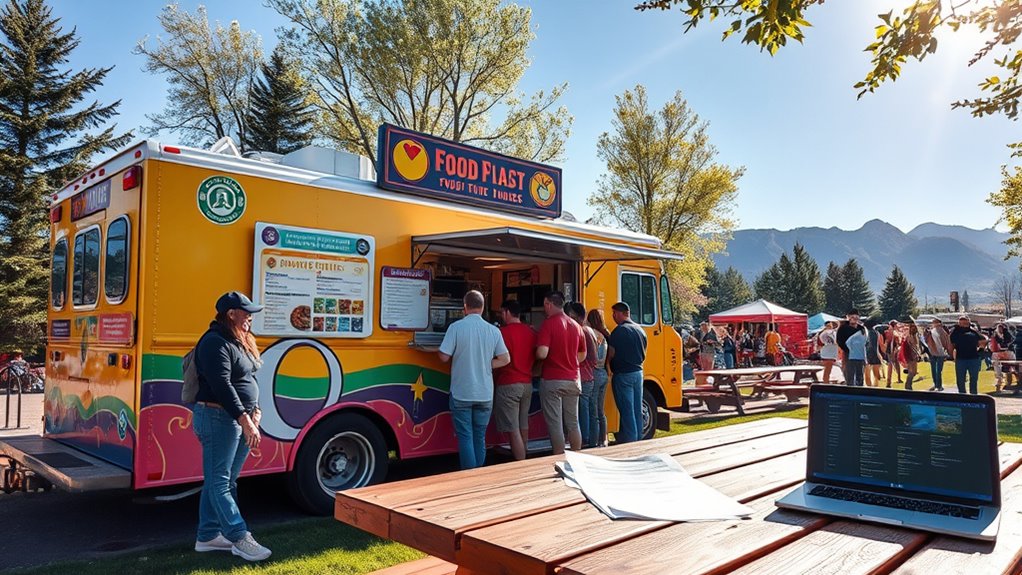
Choosing the right locations for your food truck in Colorado Springs is crucial for attracting customers and maximizing sales. You need to navigate zoning laws that restrict where you can operate, such as designated vending zones downtown or private property with proper permissions. High-traffic areas like downtown, near tourist spots like Garden of the Gods, and event venues are ideal but require permits and compliance with distance rules from businesses, schools, and parks. Parks offer opportunities but demand park-specific permits and insurance. Proximity to business districts can attract lunchtime crowds, provided you avoid blocking entrances or violating distance restrictions. Rotating locations based on foot traffic and special events, combined with social media marketing, helps boost visibility and customer flow while complying with local regulations. Incorporating elements of modern farmhouse style in your booth or branding—such as rustic signage or cozy textiles—can also attract customers seeking a welcoming and trendy vibe.
Crafting a Menu That Meets Food Safety Standards
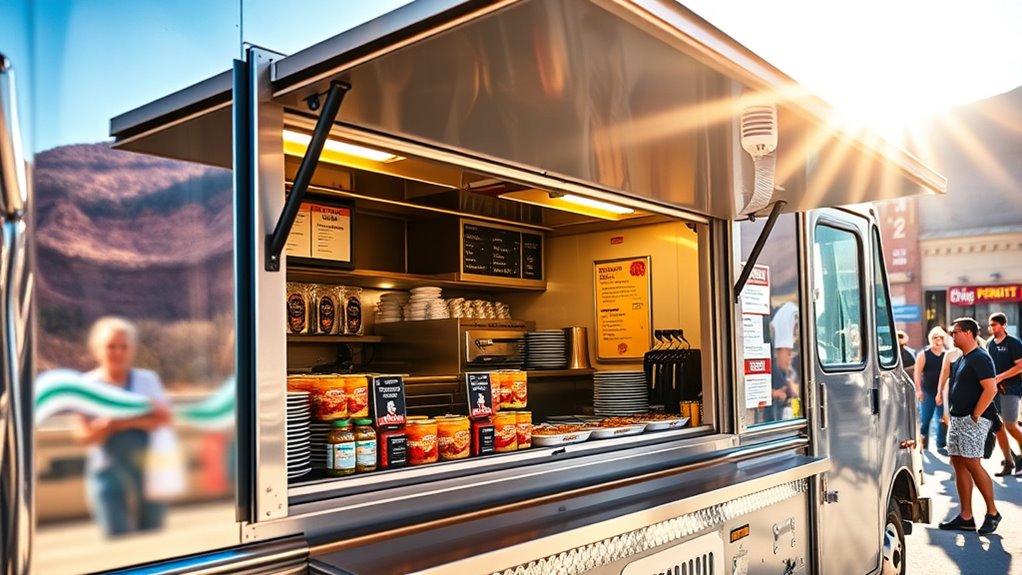
When designing your menu, focus on safe handling protocols, proper storage, and temperature control to prevent foodborne illnesses. Use correct techniques for storing ingredients and maintaining temperatures during prep and service. By doing so, you’ll guarantee your offerings are both delicious and compliant with food safety standards. Additionally, understanding the requirements for food safety permits will help you ensure your menu practices meet all legal standards. Implementing proper temperature control is essential to prevent bacteria growth and ensure food safety throughout the entire process.
Food Handling Protocols
Crafting a menu for your Colorado Springs food truck requires careful attention to food safety standards, especially given the limited space and equipment. You must ensure all food handlers have valid certifications, like a Food Handler Card, and undergo thorough training on proper handwashing, glove use, and avoiding bare-hand contact with ready-to-eat foods. Consistent training updates help maintain high safety standards. Use verified cooking methods and reliable thermometers to monitor temperatures, ensuring hot foods stay above 135°F and cold foods below 41°F. Design your menu to minimize messy or greasy items, making sanitation easier. Regularly clean and sanitize surfaces, utensils, and equipment, and dispose of waste properly. Finally, establish strict protocols for temperature control, cleaning schedules, and staff hygiene to keep food safe and compliant. Proper storage procedures are essential to prevent cross-contamination and ensure food remains safe during service.
Safe Storage Practices
Proper storage practices are essential to maintaining food safety standards in your Colorado Springs food truck. Use food-grade, non-toxic containers that are airtight and moisture-proof to prevent spoilage and contamination. Separate raw and cooked items with color-coded labels or containers to minimize cross-contamination. Store allergen-containing ingredients in sealed, insulated bins to avoid cross-contact. Clearly label all items with production and expiration dates, and follow a first-in, first-out system to ensure freshness. Keep storage areas clean, dry, and pest-free, with shelves positioned properly for air circulation. Segregate storage for cleaning chemicals and non-food items. Regularly monitor storage conditions with digital logs and sanitizer test strips. Mobile units are intended to physically report to the commissary each operating day, which helps ensure consistent compliance with health and safety standards. Maintaining proper storage conditions also involves monitoring storage temperatures, which is critical for preventing bacterial growth and ensuring food safety. These practices help guarantee safe, compliant, and efficient food storage in your mobile operation.
Temperature Control Measures
To guarantee your Colorado Springs food truck meets food safety standards, you need to establish effective temperature control measures through careful menu planning. Make certain your truck has an accurate thermometer scaled from 0°F to 220°F, with digital options recommended for precision. Conspicuous thermometers in refrigeration units are essential for continuous monitoring, and routine checks by staff are necessary to verify proper cooking temperatures, especially for high-risk foods like eggs and meats. Mechanical refrigeration is mandatory for cold foods, with separate storage to prevent cross-contamination. Limit menu items that require extensive on-site cooling or hot holding, focusing instead on pre-prepared or cold foods. Plan rapid cooling procedures off-site and ensure all foods are received at proper temperatures. Regular temperature monitoring and adherence to Colorado food safety regulations are vital for compliance and safety. Proper temperature control is a critical aspect of maintaining food safety standards and preventing foodborne illnesses. Additionally, implementing consistent temperature checks throughout the day helps identify potential issues before they compromise food safety.
Effective Marketing and Promotion Strategies for Food Trucks
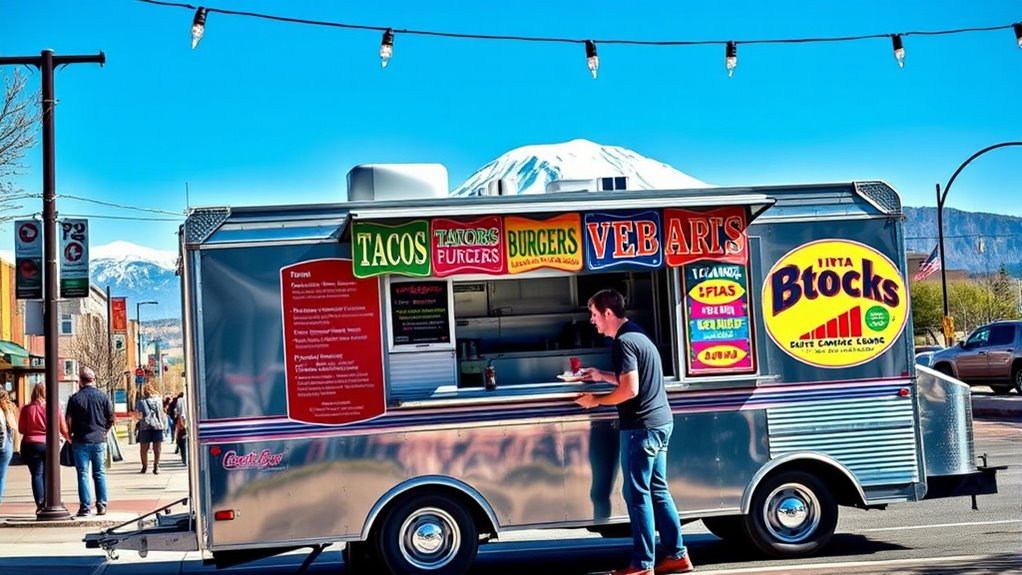
To attract more customers, you should focus on leveraging local events and community activities to boost your visibility. Utilizing social media platforms and targeted advertising can substantially increase your reach and engagement. Building strategic partnerships with other businesses and organizations helps create lasting relationships that drive repeat traffic and grow your brand presence. Additionally, participating in at least three festivals or events annually can significantly enhance your exposure and customer base industry participation. Incorporating knowledge about juice cleanse benefits or trends can also appeal to health-conscious patrons and diversify your menu options.
Leverage Local Events
Participating in local food truck events offers a powerful way to boost your visibility and attract new customers. These events draw large, diverse crowds, giving you the chance to showcase your offerings to a wide audience. Weekly events like Food Truck Tuesdays provide consistent exposure, while larger festivals such as the 719 Battle of the Food Trucks can connect you with up to 50 vendors and thousands of patrons. Partnering with local businesses and community centers expands your marketing reach. Positioning your truck in high-traffic areas like downtown Colorado Springs and scheduling during peak times ensures steady foot traffic. Engaging with event visitors through samples, discounts, or contests builds relationships and encourages repeat visits, strengthening your presence in the local food scene. Food Truck Tuesday is an excellent example of a recurring community event where vendors can regularly connect with residents.
Utilize Social Media
Leveraging social media is essential for maximizing your food truck’s visibility and attracting new customers. Use high-quality images and engaging videos to showcase your menu and behind-the-scenes moments, drawing attention on platforms like Instagram and Facebook. Maintain a consistent posting schedule to keep your audience engaged and aware of your locations and offerings. Incorporate authentic content, such as behind-the-scenes footage, to personalize your brand. Use strategic hashtags and location tags to boost visibility and reach local audiences. Engage with followers by responding promptly to comments and messages, encouraging user-generated content, and running interactive campaigns like giveaways. Consider paid ads on Instagram and Facebook to expand your reach. Regularly monitor performance metrics to refine your social media strategy and build a loyal customer base in Colorado Springs. Effective use of analytics and reporting can help you understand what content resonates most and optimize your marketing efforts.
Build Strategic Partnerships
Building strategic partnerships can substantially boost your food truck’s visibility and customer base in Colorado Springs. Partner with local bars, breweries, and businesses to create joint promotions like “beer and burger” deals, encouraging repeat visits. Regular appearances or special events at these venues build familiarity and loyalty. Collaborate on social media campaigns and co-host events to expand your reach. Supporting community events, such as charity drives or food tastings, fosters goodwill and strengthens your brand locally. Work with influencers and food bloggers to generate authentic buzz and social proof. Partner with festivals and markets for cross-promotion, exposing your truck to larger audiences. Additionally, implementing effective marketing strategies can optimize your outreach efforts and maximize engagement. Finally, develop loyalty programs with local businesses, incentivizing customers to return and reinforcing your presence in the community. Establishing mutually beneficial relationships can lead to long-term growth and consistent patronage.
Ensuring Regulatory Compliance and Insurance Coverage
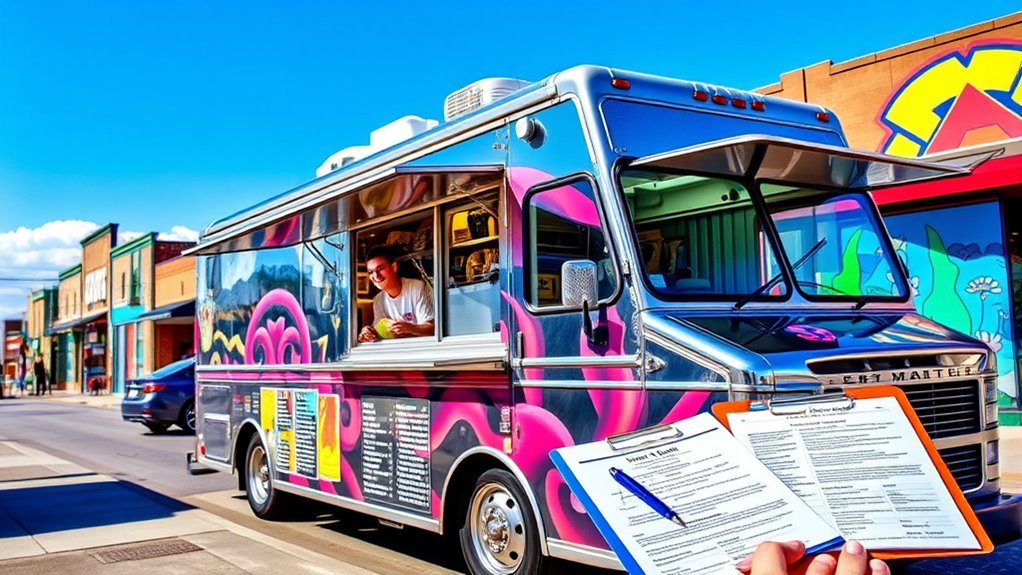
Ensuring regulatory compliance and adequate insurance coverage is essential for your food truck’s smooth operation in Colorado Springs. Staying compliant helps you avoid fines, shutdowns, and liability issues. Here are key steps:
- Obtain necessary permits, including food safety and fire safety, and keep them current. Legislation now streamlines licensing across jurisdictions, making it easier to maintain valid permits. Additionally, understanding the offensive and defensive security strategies involved in cybersecurity can help you protect sensitive business information from potential threats.
- Secure extensive insurance—general liability, commercial auto, and equipment coverage—to protect against accidents and damages.
- Follow local health, safety, and zoning laws, even with reciprocity agreements, and ensure staff are trained in food safety and fire prevention.
Tips for Successful Operations and Business Growth
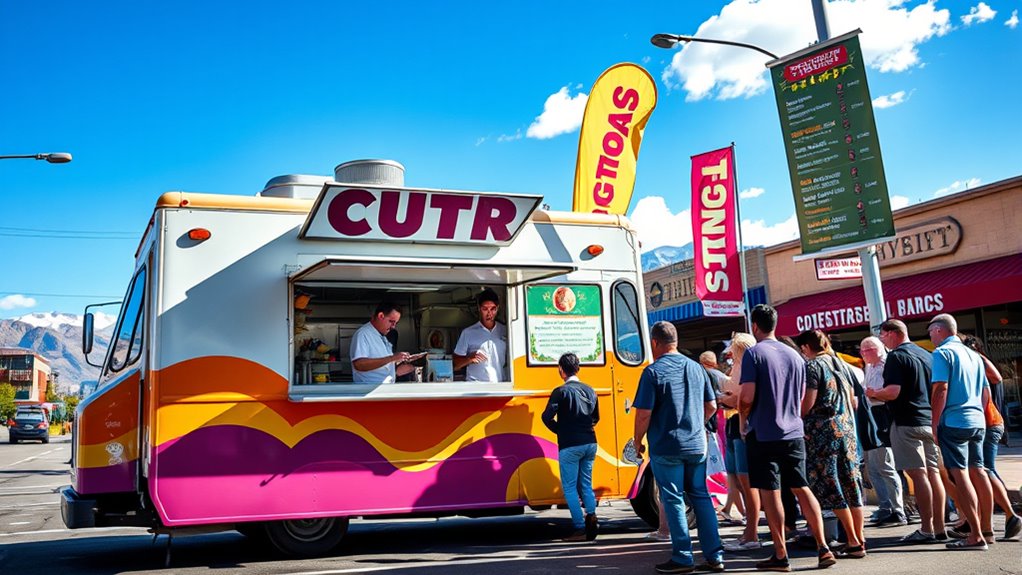
To succeed in the competitive Colorado Springs food truck scene, focusing on efficient operations and strategic growth is essential. You should optimize staffing by cross-training 2–4 team members to handle cooking, cashier, and customer service roles. Schedule staff during peak times to maximize sales while reducing hours off-peak. Clear roles help speed service, and investing in employee retention reduces costly turnover. Streamline your menu to cut costs and improve consistency, updating it regularly based on customer feedback and trends. Choose high-foot-traffic locations like downtown, events, and food truck parks, and rotate spots to find your best performers. Use social media and online reviews for marketing; keep customers engaged. Track finances closely to identify growth opportunities and maintain profitability.
| Staffing | Menu | Location & Marketing |
|---|---|---|
| Cross-train staff | Streamline menu | High-traffic areas |
| Schedule peak hours | Update based on trends | Community events |
| Clear roles | Seasonal specials | Social media engagement |
| Employee retention | Signature/differentiators | Location rotation |
| Reduce turnover | Catering opportunities | Customer reviews & promos |
Frequently Asked Questions
How Long Does It Typically Take to Obtain All Necessary Permits?
You’re probably wondering how long it takes to get all the permits. Typically, it takes about 3 to 6 weeks to complete everything, including vendor permits, health licenses, zoning, and sales tax registration. Starting early and submitting complete applications assists in avoiding delays. For temporary event permits, you can expect quicker processing, usually within 1-2 weeks. Being organized and proactive ensures a smoother, faster permit approval process.
Are There Any Restrictions on the Type of Cuisine Allowed?
You might think there’s a secret cuisine blacklist, but surprisingly, Colorado Springs imposes no restrictions on what food you serve. The irony? While you’re free to choose any cuisine, you must adhere to strict health and safety rules that could fuss over your cooking methods or ingredients. So, go ahead and pick your favorite—just remember, safety and sanitation come first, regardless of what you’re cooking.
Can I Operate a Food Truck on Private Property in Colorado Springs?
You can operate a food truck on private property in Colorado Springs if you get the right permissions. First, secure written approval from the property owner and obtain a temporary use permit from the city. Guarantee your location is zoned appropriately, like commercial or industrial areas. You’ll also need a Mobile Food Vendor License, Retail Food License, and a Colorado Sales Tax License. Follow all safety and health regulations to stay compliant.
What Are the Specific Fire Safety Requirements for Cooking Equipment?
Did you know fires caused by cooking equipment account for nearly 60% of restaurant fires? You need a fire permit if you use fuel or cook greasy foods on your truck. Install a Type I kitchen hood with an automatic suppression system, and keep fire extinguishers nearby—specifically a 2A:10BC and a 1.5-gallon Class K for grease. Make certain vents are properly placed, and avoid storing combustible materials within 10 feet of your appliances.
Is There a Recommended Timeline for Renewing Permits and Licenses?
You should start your renewal process about 1 to 1.5 months before your permits expire. This gives you enough time to gather updated documents, pass inspections, and address any issues that might arise. Planning ahead helps you avoid business interruptions. Regularly monitor your permit expiration dates and keep organized records of insurance, health reports, and registrations to guarantee a smooth renewal process.
Conclusion
Launching your food truck in Colorado Springs might seem straightforward, but don’t forget the tangled web of permits, costs, and location scouting. Ironically, the very rules designed to keep your business safe could also turn into roadblocks. Yet, with a little persistence and a dash of creativity, you’ll not only serve up delicious meals but also navigate the chaos — turning your food truck dreams into a thriving reality amidst the city’s busy streets.
